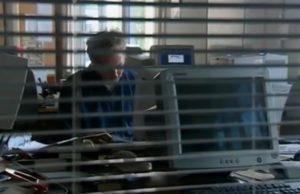- Parallel lines - 26th January 2026
- Burn bridges… - 26th January 2026
- Poll dancing - 23rd January 2026
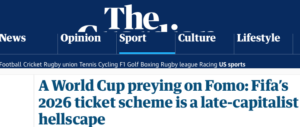 A huge final push is being made to prepare for the FIFA World Cup next year, but even before it begins, major concerns are being raised.
A huge final push is being made to prepare for the FIFA World Cup next year, but even before it begins, major concerns are being raised.
The way tickets are being sold for the event has been condemned, with one UK paper describing it in this way: “Dynamic pricing, crypto detritus and corporate doublespeak have made the task of buying 2026 World Cup tickets a grim case study in the monetization of emotion”.

Worries about high temperatures, too, are being highlighted, although the alarm is as nothing compared with those on holding the tournament last time in the desert state of Qatar where footballers faced playing in matches where it could be 38 degrees celsius in July.
The temperatures at 14 of the 16 stadiums being used for the 2026 FIFA World Cup could exceed potentially dangerous levels during the tournament, and FIFA is being urged to avoid afternoon games at six of the locations with the highest heat risk and no indoor air conditioning.
The warning comes from researchers who have studied the likely events at the contest which is being held in America, Canada and Mexico.
This all appears to have echoes of the one in Qatar which was mired in controversy, and which the kind of investigative journalism specialised in by our Editor, Welshman Phil Parry, played a major role in exposing.

It is illegal to be gay in Qatar, it was feared that thousands of migrant workers may have died in building the infrastructure for the FIFA World Cup, and there were accusations of bribery to secure the competition in the first place.
The body which awarded the matches to Qatar (FIFA) has been at the centre of an enormous storm over alleged corruption.
Its former vice-president Jack Warner faced an arrest warrant issued at the request of US authorities, who filed charges against him and 13 others.
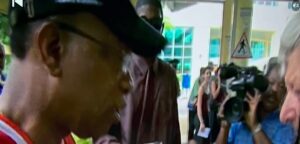
The man in charge of FIFA at the time (Sepp Blatter) has also been accused of corruption, although earlier this year he was cleared of any wrongdoing by authorities in Switzerland in relation to a massive ‘disloyalty payment’ to a friend and former colleague.
Mr Blatter’s lawyers then described it as “a valuable employment relationship” and said “the payments were valid compensation and nothing more”.
Meanwhile the Qatar World Cup chief Hassan Al Thawadi has declared that the tournament changed perceptions of the region and transformed his country, while insisting there should be recognition for improved workers’ rights.
“This was a celebration of the Arab people, of our culture, of our tradition, of our history”, Mr Al Thawadi proclaimed during an interview in Qatar’s capital, Doha. “It was a platform for bringing people together in an unprecedented way. It changed the perception of this part of the world, and allowed us to showcase the best in us”, he added.
Unfortunately these fine words hid a dark reality.
The Sunday Times, disclosed that the country had secretly offered £400 million to FIFA, just 21 days before being awarded the event, and once the announcement was made, more alarm bells started to ring.
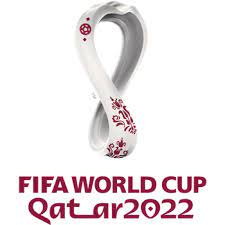
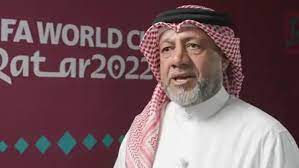
The country is slightly smaller than Connecticut and had scant soccer pedigree, but in December 2010 the tournament was given to it even so, during a bidding process that, according to American authorities, was riddled with corruption.
Terrible remarks from Khalid Salman, a retired football star from Qatar, and ambassador for the football World Cup, have underscored the awful facts that gay people there may endure a punishment of up to three years in prison, as well as knowing they could even face the death penalty under sharia law if they are Muslim.
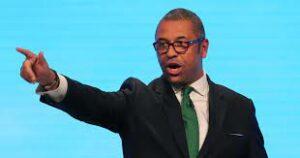
He used an Arabic term for being homosexual meaning that it was a “damage in the mind”, speaking on the German public broadcaster ZDF. Mr Salman also appallingly said that gay people brought in to Qatar something that was “not good”, and he was worried children in his country might see gay men and women. He was then swiftly cut off by a media adviser.
This medieval approach to being gay in Qatar caused a huge storm, with remarks from politicians adding to it. The then Foreign Secretary, James Cleverly said even before them, that fans should be: “Respectful of the host nation” (which has a TINY population of just 2.9 million people, but with an estimated 1.7 million migrant workers). However Lucy Powell the Shadow Culture Secretary at the time declared: “This is shockingly tone deaf from James Cleverly”.
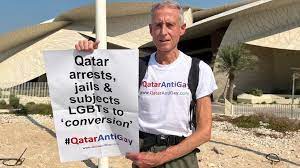
Under the headline: Why Qatar makes this football fan so uneasy”, The then Times columnist David Aaronovitch wrote: “…it is effectively a monarchical dictatorship”, as well as: “…I wouldn’t dream of going (to Qatar). Even watching from afar feels horribly like collusion. It’s all a bit sad”.
Others though, HAVE gone to Qatar, but for reasons other than those held by some Welsh football fans – to protest about its severe laws. The Lesbian, Gay, Bisexual and Transgender (LGBT) campaigner Peter Tatchell demonstrated against them in Doha, where he held up a placard which read: “Qatar arrests, jails and subjects LGBTs to ‘conversion’”.
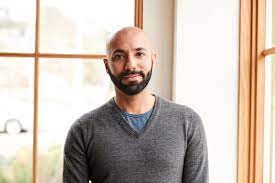
Earlier this year, under the headline ‘DOCTOR BECOMES ‘FIRST’ QATARI TO PUBLICLY COME OUT AS GAY’ The Independent reported that Nas Mohammed said: “I walked into a gay club and I knew I was 100 per cent gay. I went home and cried – I thought my life is in crisis. I thought I was going to go to hell, my life is damned”.
One leading Welsh football presenter said: “A producer I work with is gay and he can’t go!”.

Even Mr Blatter, stated that the decision to award the World Cup to Qatar was a “mistake”. We are told this was to do with the size of the country, and not connected to human rights abuses, but his comments will only add to the worrying headlines about Qatar.
Mr Blatter’s news came as 10 European football associations (including those of England and Wales) announced: “human rights are universal and apply everywhere”. Peaceful protests were planned by some players, while England’s defeated Harry Kane and nine other captains of European teams (among them the Wales captain Gareth Bale) were to wear ‘One Love’ armbands in order to promote diversity and inclusion.
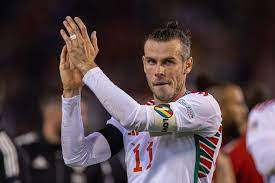
But it was decided NOT to wear them following a threat from FIFA that players could face an instant yellow card for doing so. Afterwards, a joint statement from the Football Associations of England, Wales, Belgium, Denmark, Germany, The Netherlands and Switzerland declared. “We are very frustrated by the FIFA decision which we believe is unprecedented – we wrote to FIFA in September informing them of our wish to wear the One Love armband to actively support inclusion in football, and had no response”. They added: “FIFA has been very clear that it will impose sporting sanctions if our captains wear the armbands on the field of play“
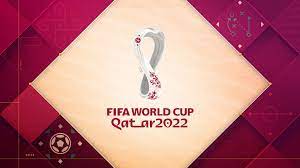
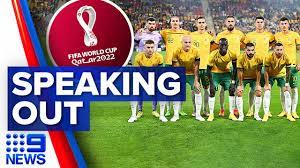
Denmark were donning ‘toned-down’ shirts in protest, with kit provider Hummel saying it did “not wish to be visible”, while Australia’s squad released a video urging Qatar to abolish its laws banning same-sex relationships.
Two excellent books laid bare in horrifying detail the darker side of life inside Qatar. It has used the World Cup as a form of ‘soft power’, to boost the profile of the state, however there are serious doubts about the way this has been done.
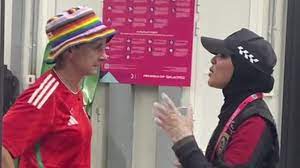
They are: ‘Hidden Stories From One of the Richest Nations on Earth’ by John McManus, as well as ‘Qatar and the 2022 FIFA World Cup : ‘Politics, Controversy, Change’ by Paul Michael Brannagan and Danyel Reiche. The London Review of Books (LRB), which featured them, has underlined the nature of laws in the state: “Homosexuality is illegal in Qatar, and though the organisers of the World Cup have insisted that everyone is welcome it remains to be seen how public demonstrations of same-sex affection will be handled; earlier this year one of the men in charge of security at the tournament Major General Abdulaziz Abdullah al-Ansari, warned that rainbow flags may be taken from fans for their own protection”.
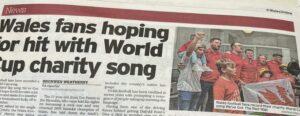 Despite everything, football supporters were urged to celebrate Wales’ qualification, and a group of Welsh fans even recorded a charity song to mark the occasion.
Despite everything, football supporters were urged to celebrate Wales’ qualification, and a group of Welsh fans even recorded a charity song to mark the occasion.
The Cardiff-based newspaper South Wales Echo (SWE), as well as the website version WalesOnline (WO) were particular cheerleaders, and they ‘reported’: “Those behind the song We’ve Got The Red Wall hope it will become a hit on the terraces and make it to number one before the tournament kicks off in Qatar in November”. One of those who made it was the senior Welsh journalist and author, Tim Hartley, who was Head of News at the Welsh Government (WG) and Director of Corporate Affairs at S4C. He flew out there to follow the Welsh team.
 In one Facebook (FB) post a day before the tournament kicked off, and including a link to a UK newspaper piece with Daffydd Iwan’s ‘Yma o Hid’, he said: “People are finally ‘getting’ why we bang on about football, Wales, identity and the language. Diolch am hyn Donald. He posted, too, pictures on his FB page from inside the stadium before or during the Wales game against USA.
In one Facebook (FB) post a day before the tournament kicked off, and including a link to a UK newspaper piece with Daffydd Iwan’s ‘Yma o Hid’, he said: “People are finally ‘getting’ why we bang on about football, Wales, identity and the language. Diolch am hyn Donald. He posted, too, pictures on his FB page from inside the stadium before or during the Wales game against USA.
Mr Hartley changed his FB profile several times, as well, as he celebrated watching matches in Qatar. In another FB post, though, he appeared to have become disillusioned with the organisation of the World Cup, and said: “Great atmos in the ground but getting back was a real drag. Hotels, prices, beer and bucket hats. I’m talking all things Wales Away on Radio 4s Today programme this morning at 0720”.
 But the conditions for migrant workers in building the stadiums have been no less alarming, and they place another question mark over Mr Hartley’s decision (and that of others) to fly out to Qatar. The dreadful heat and horrendous environment have led, it’s claimed, to THOUSANDS of deaths. The Qatari authorities vigorously dispute the high number, and say only fifty have died. But the respected Non-Governmental Organisation (NGO) (Human Rights Watch [HRW]), say it is true.
But the conditions for migrant workers in building the stadiums have been no less alarming, and they place another question mark over Mr Hartley’s decision (and that of others) to fly out to Qatar. The dreadful heat and horrendous environment have led, it’s claimed, to THOUSANDS of deaths. The Qatari authorities vigorously dispute the high number, and say only fifty have died. But the respected Non-Governmental Organisation (NGO) (Human Rights Watch [HRW]), say it is true.
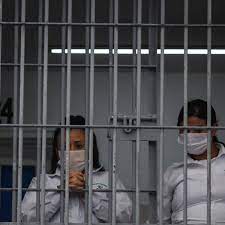
What is certainly the case, though, is that Qatar detained and then deported dozens of migrant workers who were protesting about the circumstances of their work. HRW declared: “These are the people who have literally built the World Cup from the ground up, from the desert up. They are the ones who must receive financial compensation before the first ball is kicked”.
Like those migrant workers, women are also treated like second class citizens in Qatar. Most must be veiled, and they need the permission of a male ‘guardian’, usually a father or brother, to marry, get a government job, or to apply for a university scholarship.

The jubilations over Wales qualifying were not confined to English-language media, either. The Welsh-language magazine Golwg produced a wall chart, showing the teams in each group, and the progress that must be made to reach the World Cup final.
Even Welsh football fans were outraged at the fanfare in the mainstream media. One, Dafydd Jones, of Neath told The Eye: “I have always backed the Wales team, but all this hoopla about us qualifying for Qatar left me completely cold. Especially as we went out in the first round. After all – people can’t be gay there, and I have read about the money that changed hands to get the World Cup. It’s in the wrong place anyway, and Qatar should never have got it. The heat means they have had to move all the schedules back home!”.

But at least the man in charge of it all thinks it has changed the perception of his country, even if the facts tell another story, and there are already bad headlines about the next one…
Truths like these by our award-winning Editor Phil Parry, who was gripped by the rare neurological condition Hereditary Spastic Paraplegia (HSP), have been released in a major book ‘A GOOD STORY’. Order it now!








